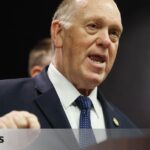
Meeting in Brasilia defended increased trade among members
Without explicitly citing President Donald Trump’s government, parliamentarians from Brics countries criticized on Tuesday in Brasilia, the trade war promoted through unilateral tariffs by the United States (USA) that impact world markets since April this year.
As president of BRICS in 2025, Brazil hosts, this week, the 11th Parliamentary Forum of the Block, which took place the meeting of the presidents of the Foreign Affairs committees of 15 countries. The group includes permanent members and partners of the main emerging economy block on the planet.
The chairman of the Brazilian Senate Foreign Relations Commission, Senator Nelsinho Trad (PSD-MS), presided over the meeting, highlighting the need to increase trade between the BRICS countries and criticizing unilateral tariff measures such as those taken by Trump.
“Our concern with increasing unilateral unilateral unilateral protectionist measures, inconsistent with WTO rules [Organização Mundial do Comércio]including the indiscriminate increase in tariff and non -tariff measures and the abusive use of green policies for protectionist purposes, ”said the parliamentarian.
The Brazilian representative added that, despite an increasingly less cooperative world, BRICS remains firm “in its commitment to fight for multilateralism.” Unlike bilateralism or unilateralism, multilateralism seeks to build solutions together with countries to the common problems of the planet.
The presidency of Brazil at BRICS occurs amid the expansion of the bloc and the beginning of Donald Trump’s new term, which has rejected multilateralism in favor of building unilateral or bilateral solutions, and bilateral are those agreed only between two countries.
Cold war
The vice president of the China Parliament Foreign Relations Commission, Deputy Wang Ke, pointed out that the Cold War mindset is returning to the world and that “some countries” are using unilateral intimidation to impose their interests.
“Some countries are applying tariffs everywhere. They openly place their own interests above the interest of the international community and ignore the multilateral trade system and the established rules. Severely infringe the legitimate rights and interests of all countries,” commented the Chinese parliamentarian.
Wang Ke defended the BRICS unit to face this situation. “BRICS is increasingly becoming the backbone of cooperation in the global south and the engine of growth. We must strengthen unity and cooperation and work together to safeguard our rights and legitimate interests,” he concluded.
The representative of the United Arab Emirates Parliament, there Alnuaimi, stressed that the world order that emerged after World War II no longer exists and defended the use of the organization to build bridges among peoples.
“Unfortunately, there is often the idea that if I earn, you lose. And the BRICS principle is the principle that we can all win,” he explained.
11th BRICS Parliamentary Forum in the National Congress. Meeting of Presidents of Foreign Affairs Committees. | Lula Marques/Agência Brasil
Local coins
Indonesia, who joined BRICS as a permanent member this year, was represented by Deputy Mardani Ali Sera, who defended the expansion of trade between the Brics countries using local currency payment means. “These payment options reinforce our economic resilience to deal with recent economic challenges,” said Sera.
The use of local coins for trade between BRICS countries, replacing the dollar, is one of the block’s main proposals. The idea is the target of harsh criticism of US President Donald Trump, who promises to tax countries that replace the dollar as a way to preserve the US currency hegemony in the global market.
Africa
The representative of South Africa, the deputy supra Mahumapelo, stressed that his country has had great benefits as a member of BRICS. He praised the work of the institution’s bank, now chaired by former President Dilma Rousseff, and defended the renovation of the UN multilateral institutions.
“The architecture of the international system promotes an imbalance by the disproportionate influence of developed countries and large corporations. Although this imbalance continues in the global trade system, this financial architecture is rooted in unilateral arrangements,” said the South African representative.
The reform of international organizations, such as World Trade Organization (WTO), International Monetary Fund (IMF) and UN Security Council, is among the main demands of BRICS.
Representing Nigeria, who joined Brics as a partner member this year, Deputy Busayo Oluwole Oke also criticized protectionist measures and unilateral economic sanctions.
“We see the beginning of a new world order with new challenges. BRICS trade is not just a goal, it is a necessity. And this becomes even more crucial with current ruptures still advancing in the global arena of western commerce. May we diversify our trading channels, less dependent on international markets,” said the Nigerian.
Latin America
In addition to Brazil, which is a permanent member of BRICS, Latin America has two other members: Cuba and Bolivia, who are partner members. Argentina became a permanent member of the bloc, but ultra -right president Javier Milei decided to take the country out of the organization after taking over the pink house.
Bolivian representative, parliamentarian Felix Ajpi Ajpi, recalled that his country offers many opportunities for investments for having the largest lithium reservations on the planet, one of the main minerals used by industry in energy transition.
“We advocate to add more countries to this modern system [do Brics]. Therefore, we thank Brazil for supporting us, so that we can become partners in this multipolar world, which is a peaceful solution for development, as we suffer a lot of time from unilateralism, ”he said.
Cuba is another country that joined this year as a partner member. The vice president of the Cuba Foreign Relations Commission, Alberto Nuñez Betancourt, stressed that BRICS is a challenge for Western hegemony.
“The BRICS challenge is to promote the new development bank [NBD] using local currencies and creating projects with financial support that allows Latin and Latin American countries to explore technology plans with better conditions compared to those who are imposed by the IMF, ”said the Cuban parliamentarian.
The NDB – Banco do Brics – currently has about 100 financed projects that total approximately $ 33 billion. The bank plays a central role in the strategy of the block to expand investments in Bloco and South Global countries.
Brics
Initially formed by Brazil, Russia, India, China and South Africa, the coalition of countries included last year as permanent members: Iran, Saudi Arabia, Egypt, Ethiopia and the United Arab Emirates.
This year, it was Indonesia’s turn to be included as a permanent member. In addition, in 2025, the partner members were inaugurated, with the inclusion of nine countries: Belarus, Bolivia, Cuba, Kazakh, Malaysia, Nigeria, Thailand, Uganda and Uzbekistan.
Originally published by Agência Brasil on 03/06/2025
By Lucas Pordeus León – Reporter of Agência Brasil – Brasília
Edition: Vinicius Lisboa
Source: https://www.ocafezinho.com/2025/06/04/parlamentares-do-brics-criticam-guerra-tarifaria-promovida-pelos-eua/

